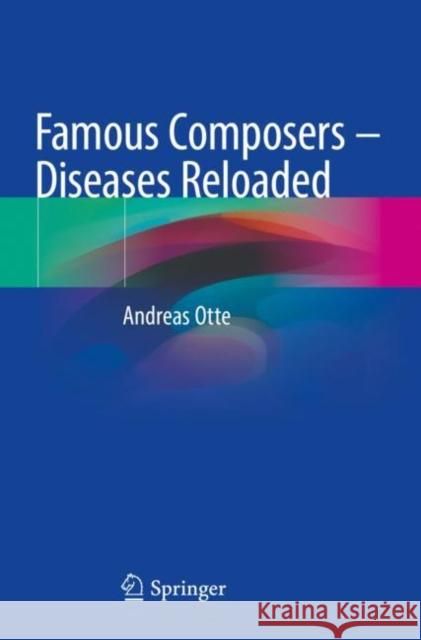Famous Composers - Diseases Reloaded » książka



(netto: 153,32 VAT: 5%)
Najniższa cena z 30 dni: 154,18
ok. 16-18 dni roboczych.
Darmowa dostawa!
1 Introductory to the Topic
1.1 The Fascination about Diseases of Famous Composers
1.2 The Difficulties of Retrodiagnoses
1.2.1 Diagnostic and Therapeutic Possibilities1.2.2 Interpretation of Symptoms
1.2.3 Absence of Suspected Diagnosis
1.2.4 Later Appearance of Information about Diseases
1.2.5 Present-day Methods1.2.6 Retrodiagnosis as Retrospective Diagnosis
1.2.7 Source Data
1.3 The Change of Diseases over Time
2 Johann Sebastian Bach (1685–1750)
2.1 Introduction
2.2 Bach´s Diseases
2.3 Conclusions
3 Domenico Scarlatti (1685–1757)
3.1 Introduction
3.2 Scarlatti´s Diseases3.3 Conclusions
4 Nicolò Paganini (1782–1840)
4.1 Introduction
4.2 Paganini´s Diseases4.3 Conclusions
5 Robert Schumann (1810–11856)
5.1 Introduction
5.2 Schumann´s Diseases
5.3 Conclusions
6 Francisco Tárrega (1852–1909)
5.1 Introduction
5.2 Tárrega´s Diseases
5.3 Conclusions
7 Maurice Ravel (1875–1937)
6.1 Introduction
6.2 Ravel´s Diseases
6.3 Conclusions
8 Heitor Villa-Lobos (1889–1959)
6.1 Introduction6.2 Villa-Lobos´ Diseases
6.3 Conclusions
Appendix
A.1 The Nekrolog of Johann Sebastian Bach in Original Language
A.2 Extract on Johann Sebastian Bach from "Musicalische LEXICON Oder Musicalische Bibliothek, …. Von Johann Gottfried Walthern, … Leipzig, 1732", translated into English by Walter Emery (Emery, 1942)
A.3 Extract on Johann Sebastian Bach from "The Bach Genealogy", translated into English by Walter Emery (Emery, 1942)
Andreas Otte, MD, is a board-certified specialist in Nuclear Medicine and Professor of Biomedical Engineering in the Division of Medical Engineering, Department of Electrical Engineering, Medical Engineering and Computer Science, Offenburg University, Germany. Prof. Otte received his graduate and postgraduate medical education at the University Hospitals Freiburg, Germany, and Basle, Switzerland, and at the Paul Scherrer Research Institute in Villigen, Switzerland. Thereafter he held various leading positions in clinical research with Pfizer in Freiburg, Germany (International Medical Research, Pfizer Global Pharmaceuticals) and at the University Hospital Freiburg. From 2002 to 2009, he was a Visiting Professor of Nuclear Medicine in the Medical Faculty of the University of Ghent in Belgium. He took up his present position in 2010. Andreas Otte is the author of many peer-reviewed journal articles and the author or editor/co-editor of a number of books, including the Springer trilogy PET and SPECT in Neurology, PET and SPECT in Psychiatry, and PET and SPECT of Neurobiological Systems or the monograph Functional Neuroimaging in Whiplash Injury. His research focus is on neurosciences including functional neuroimaging, brain-machine interfaces, and intelligent neuroprosthetics. He is member of the Offenburg University research institutes Campus Research & Transfer and the Peter Osypka Institute of Medical Engineering. Awarded a series of international scientific prizes, he was nominated Editor of the Board of the European Journal of Nuclear Medicine (1998–2003), the Hellenic Journal of Nuclear Medicine (since 2003), Archiv für Kriminologie [Archives of Criminology] (since 2020), and Prosthesis (since 2020).
In addition, Andreas Otte is also a guitarist and winner of various music and composition competitions as well as a former student of Professor Andreas Higi (University of Music Trossingen). He published a series of musicological essays, books on medical history, and the famous 6th edition of "Kerners Krankheiten großer Musiker." The Joachim Trekel Music Publishing House Hamburg has released some of his works composed for guitar solo, guitar with various instruments as well as for guitar and orchestra.
The life and death, but also the creative work of famous musicians is closely linked to their personal medical histories. In "Famous Composers – Diseases Reloaded" these case histories are vividly reconstructed on the basis of authentic biographical testimonies and closely linked to the personalities of the musicians. The latest research findings on the pathophysiology of these composers will be woven into the overall picture. Was Paganini's "devilishness" caused by a hereditary disease? Did Scarlatti have strange signs of illness on his fingers? What did Bach really die of? How did "Christel" from a dubious milieu change Schumann's entire life? What aggravated Ravel's underlying illness so that he did not complete a single composition in the last five years before his death? How did Tárrega manage to play the guitar again after his stroke with hemiplegia? Did the Brazilian Villa-Lobos' worldwide reputation help him live longer thanks to the best treatment available to him? Andreas Otte, physician and musician, has incorporated the latest medical history research into the composers' pathographies. This book is an exciting and "well-tempered" reading experience not only for physicians, music lovers, musicologists and musicians, but for all readers who want to develop a basic understanding of the pathophysiology and life scores of these great masters under current conditions from today's perspective.
1997-2026 DolnySlask.com Agencja Internetowa
KrainaKsiazek.PL - Księgarnia Internetowa









